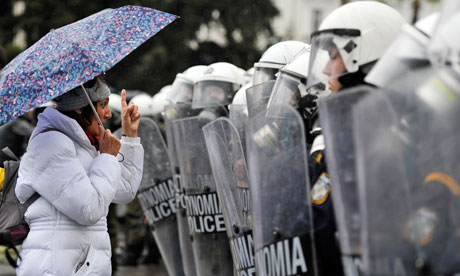Helena Smith in Athens guardian.co.uk, Tuesday 7 February 2012 20.43 GMT
Lucas Papademos on verge of persuading Athens' political leaders to accept conditions attached to further rescue funds
A Greek protester confronts police outside the parliament building in Athens during Tuesday's general strike as the prime minister edged closer to a bailout deal. Photograph: Louisa Gouliamaki/AFP
Greece's prime minister, Lucas Papademos, was on the brink of a deal tonight to avoid a chaotic default by the debt-choked country, with officials saying an agreement would "almost certainly" be clinched when talks resumed on Wednesday.
After a drama-filled few days as discussions were repeatedly delayed, he had to persuade political leaders backing his interim administration to accept the tough conditions attached to further rescue funds from the European Union and the International Monetary Fund.
"There are outstanding technical issues but when they meet tomorrow we can expect the politicians to accept it," said one well-placed official after talks between Papademos and party chiefs were pushed back yet again.
"Part of the reason why the discussion is also taking longer is that the leaders have to come to terms with what they have to accept."
Talks were delayed for three hours on Tuesday because the final text had to be translated into Greek for Georgios Karatzaferis, leader of the far right coalition partner LAOS, to properly understand, the official said.
If agreed the €130bn (£108bn) lifeline – Greece's second bailout in as many years – is likely to be endorsed by all 48 members of the Greek cabinet on Tuesday. The Athens stock exchange rallied as news filtered through that a deal was finally in the offing with bank stocks rising 6.5%.
As night fell, the Greek media reported that a deal to write down the country's private sector debt – an integral part of the programme – was also close to completion, with Charles Dallara, head of the Institute of International Finance, which represents private bondholders, also meeting Papademos.
Highlighting how difficult the negotiations had been, the Greek finance minister, Evangelos Venizelos, who will present the accord at a euro group meeting on Thursday, described them as like Hydra's head.
Papademos, a technocratic economist who was appointed with the express purpose of securing the deal, had asked for a detailed analysis of what bankruptcy would look like for Greece ahead of the meeting with the coalition leaders.
Political manoeuvring amid rising anger over the biting austerity measures that the new deal will entail made talks more difficult than expected.
With a general election looming as soon as April, political leaders are reluctant to sign off on reforms that are likely to meet bitter public resistance .
Greece's public and private sector ground to a halt on Tuesday as unions called a 24-hour nationwide strike over wage, pension and job cuts as well as benefits.
Across Athens, buildings were spray-painted with slogans such as "rise up people" and "we won't be their slaves." Police estimated 10,000 people rallied in the capital despite heavy rain with some protesters attempting to storm the Greek parliament in Syntagma Square.
Riot police moved in firing teargas after demonstrators tried to burn a German flag. Anti-German sentiment is growing with many in Greece blaming Europe's paymaster as the source of the country's woes
Industrial action is expected to be stepped up in the coming weeks with unionists warning of a "tsunami of protests" — even if many Greeks also feel that the cost-cutting reforms are long overdue.
"The battle is maturing," said Nikos Zeppos, a pensioner and stalwart member of the KKE communist party. "With these latest measures people will wake up. The numbers out there today may be small but all it will take is a spark, a little thing, to set the whole thing off.
Greek shares rally as prime minister closes in on bailout deal | Business | The Guardian
![The [Greek] European Tragedy](https://blogger.googleusercontent.com/img/b/R29vZ2xl/AVvXsEiWKI5s90SFm1wWTk6bs4p7CgslaC2SnYPsrZhb-B-smOufNNCSxCvpBLI9hOB-LsXZjir_PNmEiMk2-E62F3xkg96IoC6QFAaZAnPRTVH340IN9WBRmWJqPkjWlgyRj3zpALp7h6hvA58/s920/GkBack_new.jpg)
